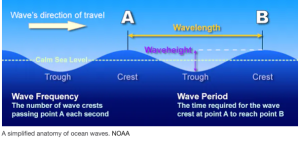This isn’t particularly good news, but there are probably a lot more rogue waves out there than we think. Indeed, a new study by a group from the University of Melbourne, involving measuring actual storms on the Southern Ocean, says that rogue waves, the subjects of ancient mythology, seamen’s nightmares and artists’ imaginations, are much more common than scientists had believed.
The new study, just published in the journal Physical Review Letters, was the work of a Melbourne team under professor Alessandro Toffoli. They measured waves on the Southern Ocean, the home of some of the fiercest storms on the planet, on board the South African icebreaker Agulhas-ll. They used three-dimensional imaging and computer algorithms to study the ocean surface, winds and wave formations.
A rogue wave is defined as a wave that is more than twice the height of the surrounding waves. One of the first one recorded was the Draupner Wave, measured off the coast of Norway in 1995. The surrounding wave heights were 40 feet; the Draupner rogue was 84 feet.

Rogue waves are generally caused by the overlap of multiple waves at the same time; the resulting energy produces a tall wall of water. Under consistent conditions, rogue waves generated this way may occur once every two days at the same location, but conditions in the ocean rarely stay consistent for very long.
Lab studies have suggested that winds contribute to rogue waves; they push harder on some already high wave formations.
The Melbourne team used sensors to study wave growth, from the early stages of a young wave fueled by the wind to mature waves, that are not influenced by it. What surprised them was that rogue waves were happening much more often than they had thought.
“We recorded waves twice as high as their neighbors once every six hours,” Toffoli wrote. “This mirrors what lab models have reported: Sea conditions theoretically more prone to self-amplification would produce more rogue waves. In contrast, mature seas don’t show an increased probability of rogue waves. We detected none under those conditions.”




